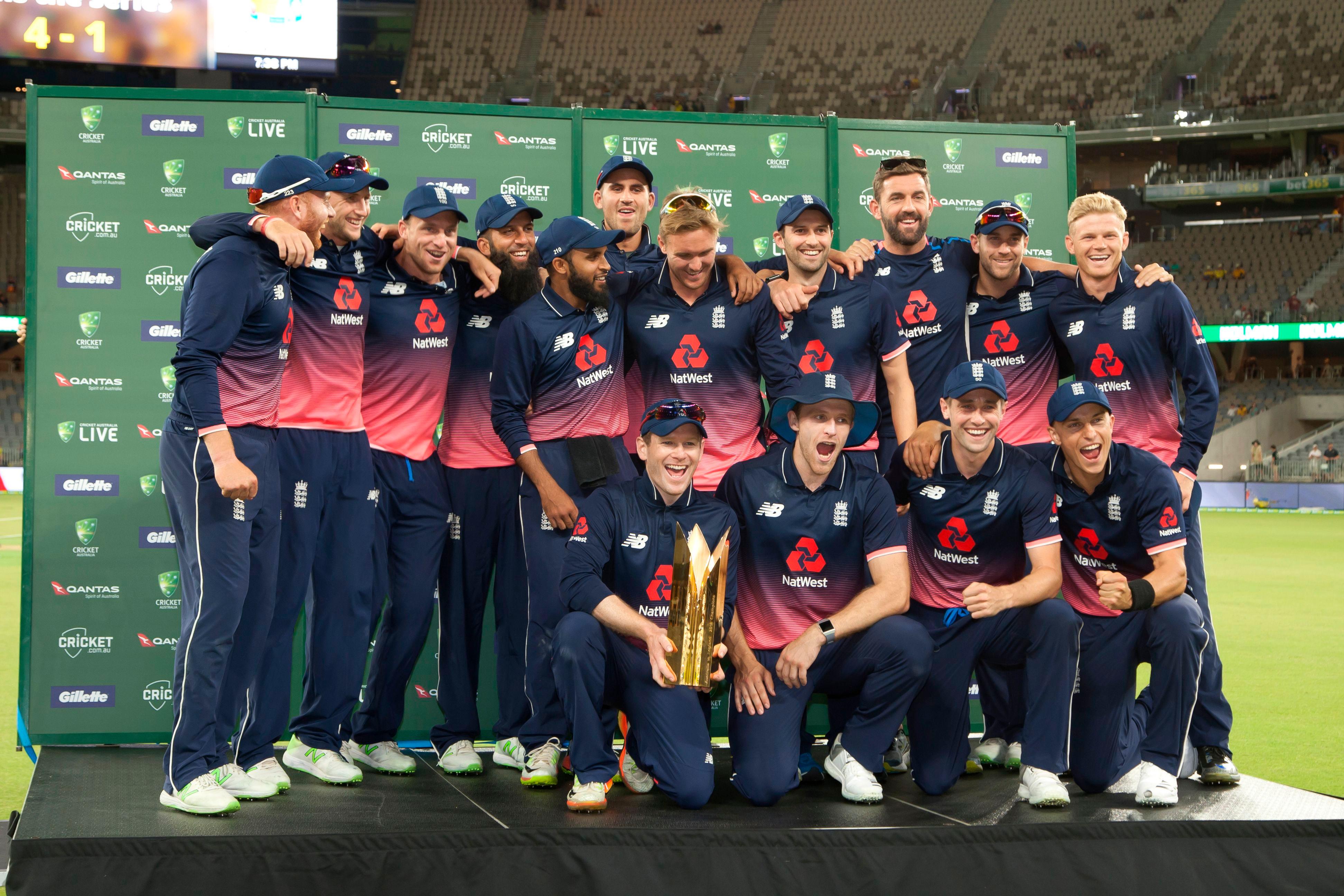ETV Bharat / sports
'ఇంగ్లాండ్ జట్టు ఫేవరేట్.. ఆసీస్ ఫైనల్కు వెళ్లొచ్చు' - india
ఇంగ్లాండ్ జట్టుకు ప్రపంచకప్ గెలిచే అవకాశాలు ఎక్కువగా ఉన్నాయని అభిప్రాయపడ్డాడు ఆస్ట్రేలియా దిగ్గజ బౌలర్ మెక్గ్రాత్. భారత్, ఆస్ట్రేలియా జట్లు కూడా బలంగా ఉన్నాయని చెప్పాడు.

మెక్ గ్రాత్
By
Published : May 27, 2019, 8:31 PM IST
ప్రస్తుత ఫామ్ దృష్ట్యా ప్రపంచకప్ను ఇంగ్లాండ్ గెలిచే అవకాశాలు ఎక్కువగా ఉన్నాయని ఆస్ట్రేలియా బౌలింగ్ దిగ్గజం మెక్గ్రాత్ అభిప్రాయపడ్డాడు. ఆసీస్ ఫైనల్ వరకు వెళ్తుందని అంచనా వేశాడు.
వన్డేల్లో మోర్గాన్ సారథ్యంలోని ఇంగ్లాండ్, కోహ్లీ సారథ్యంలోని భారత్ మంచి ప్రదర్శన చేస్తున్నాయని తెలిపాడు మెక్గ్రాత్. అన్ని జట్లు మొదటి 15, చివరి 15 ఓవర్లలో ఎక్కువ పరుగులు సాధించడానికి ప్రయత్నిస్తాయని.. కానీ 50 ఓవర్లూ పూర్తి ఆధిపత్యం ప్రదర్శించగల సత్తా ఇంగ్లాండ్, భారత్ జట్లకు ఉందని అన్నాడు.
"ప్రస్తుత జట్లను చూస్తే ఇంగ్లాండ్ మంచి ఫామ్లో ఉంది. భారీ స్కోర్లు సాధిస్తోంది. సొంత మైదానాల్లో ఆడటం వారికి కలిసొచ్చే అంశం. ఆసీస్ కూడా మంచి ప్రదర్శన చేస్తుందని ఆశిస్తున్నా. ఫించ్ సారథ్యంలోని కంగారూ జట్టు ఫైనల్ వరకు వెళ్లొచ్చు".
- మెక్గ్రాత్, ఆస్ట్రేలియా మాజీ పేసర్
దక్షిణాఫ్రికా మంచి జట్టని తెలిపిన మెక్గ్రాత్.. వెస్టిండీస్, పాకిస్థాన్ తమదైన రోజున సత్తాచాటగలవని స్పష్టం చేశాడు. ఆ జట్లకు స్థిరత్వం లోపించడం పెద్ద సమస్యని అన్నాడు. ఇంగ్లాండ్, భారత్ బలమైన జట్లుగా బరిలో దిగుతున్నాయని వ్యాఖ్యానించాడీ మాజీ ఫాస్ట్ బౌలర్.
ప్రస్తుత ఫామ్ దృష్ట్యా ప్రపంచకప్ను ఇంగ్లాండ్ గెలిచే అవకాశాలు ఎక్కువగా ఉన్నాయని ఆస్ట్రేలియా బౌలింగ్ దిగ్గజం మెక్గ్రాత్ అభిప్రాయపడ్డాడు. ఆసీస్ ఫైనల్ వరకు వెళ్తుందని అంచనా వేశాడు.
వన్డేల్లో మోర్గాన్ సారథ్యంలోని ఇంగ్లాండ్, కోహ్లీ సారథ్యంలోని భారత్ మంచి ప్రదర్శన చేస్తున్నాయని తెలిపాడు మెక్గ్రాత్. అన్ని జట్లు మొదటి 15, చివరి 15 ఓవర్లలో ఎక్కువ పరుగులు సాధించడానికి ప్రయత్నిస్తాయని.. కానీ 50 ఓవర్లూ పూర్తి ఆధిపత్యం ప్రదర్శించగల సత్తా ఇంగ్లాండ్, భారత్ జట్లకు ఉందని అన్నాడు.
"ప్రస్తుత జట్లను చూస్తే ఇంగ్లాండ్ మంచి ఫామ్లో ఉంది. భారీ స్కోర్లు సాధిస్తోంది. సొంత మైదానాల్లో ఆడటం వారికి కలిసొచ్చే అంశం. ఆసీస్ కూడా మంచి ప్రదర్శన చేస్తుందని ఆశిస్తున్నా. ఫించ్ సారథ్యంలోని కంగారూ జట్టు ఫైనల్ వరకు వెళ్లొచ్చు".
- మెక్గ్రాత్, ఆస్ట్రేలియా మాజీ పేసర్
దక్షిణాఫ్రికా మంచి జట్టని తెలిపిన మెక్గ్రాత్.. వెస్టిండీస్, పాకిస్థాన్ తమదైన రోజున సత్తాచాటగలవని స్పష్టం చేశాడు. ఆ జట్లకు స్థిరత్వం లోపించడం పెద్ద సమస్యని అన్నాడు. ఇంగ్లాండ్, భారత్ బలమైన జట్లుగా బరిలో దిగుతున్నాయని వ్యాఖ్యానించాడీ మాజీ ఫాస్ట్ బౌలర్.
KENYA SILK FARMING
SOURCE: ASSOCIATED PRESS
RESTRICTIONS: AP Clients Only
LENGTH: 7.47
SHOTLIST:
Associated Press
Thika, Kenya, 26 April 2019
1. Various of silk worms
2. Various of silk worm feeding activity
3. Various of cocoons
Associated Press
Kisumu Kenya, 7 April 2019
4. Various of thread making activity, man spinning
Associated Press
Thika, Kenya, 26 April 2019
5. Various of products made out of silk
6. Various of Muo Kasina, scientist inspecting mulberry plants
7. SOUNDBITE (English) Muo Kasina, director at National Sericulture Research Centre
"We have potential for silk in the country and in countries where it is hugely done, it is getting down (reducing). Production is lowering in China. It is more or less completely reduced in Japan. India is doing well in silk so we feel that Kenya can contribute to global silk demand."
8. Tilt up to Kasina inspecting mulberry plants in a nursery
9. SOUNDBITE (English) Muo Kasina, director at National Sericulture Research Centre
"We have been working to develop technologies for silk and so we can give farmers the seeds and have the appropriate market and regulations for silk, therefore we are thinking about having farmers in groups or what we call sericulture (production of silk) villages where they can have a common collection centre for the cocoons and we are linking farmers with the markets. As of now we have more than 5 Japanese companies that have shown interest in Kenyan silk."
10. Wide of Kasina briefing Japanese investors
11. Tilt up to Yuko Mizutori, an investor from Galali Organic
12. SOUNDBITE (English) Yuko Mizutori, an investor from Galali Organic
"100 years ago, Japan had been the largest silk exporter and after that we studied a lot about sericulture and silk. So now we have high technology of silk and sericulture, but we can't use it because Japan is too developed and also the climate in Kenya is much better than Japan for sericulture so that is why I want to cooperate with Kenya."
Associated Press
Thika Kenya, 26 April 2019
13. Various of a silk worm farmer tending to silk worms
14. Various of silk worms
Associated Press
Thika, Kenya, 26 April 2019
15. SOUNDBITE (English) Muo Kasina, director at National Sericulture Research Centre
"Silk worm farming is very attractive in Kenya because for the first time we have a crop that can give farmers income after every 3 weeks because you do silk worm rearing for 2 weeks and harvest in the third week once you deliver your produce. We have seen demand from farmers who are doing coffee and such crops because of the risk of these crops."
Associated Press
Kisumu Kenya, 7 April 2019
16. Various of Japanese scientists inspecting a silk worm farm
17. Newton Owino, a silk worm farmer at his farm
18. Various of cocoons
19. SOUNDBITE (English) Newton Owino, a silk worm farmer
"This is the 26th day and you can see the silk worms are already spinning. They are making cocoons. In other words, they have already reached the stage that we call pupal stage. So, as they spin, we harvest cocoons."
20. Various of Owino harvesting cocoons
21. SOUNDBITE (English) Newton Owino, a silk farmer
" Whatever is left for us in form of cocoons, we shall subject it to post harvesting processes that include deflossing of the cocoon and removing the pupa inside so that we remove the remaining part of it for producing the thread."
22. Various of cocoons
23. Various of silk thread extraction
Associated Press
Kisumu Kenya, 9 May 2019
24. Various of Osman Shariff, a fabric seller at his shop
25. SOUNDBITE (Swahili) Osman Shariff, a fabric seller
" When customers come to our premises and ask about prices, they usually say that the fabric is expensive and unaffordable, yet money has become scarce. We like the products that are brought in from China or Japan though the shipping costs are included, and we have to turn a profit therefore the prices become high. However, we will be happy if silk will be manufactured in Kenya as we will be able to cater for our customers accordingly."
26. Various of Osman Shariff, a fabric seller at his shop
LEAD IN:
Silk production has been steadily declining in recent years in countries where it was originally produced like China and Japan.
But Kenya is emerging as a new silk producing country due to its favourable climatic conditions.
STORYLINE:
These silk worms are giving hope to farmers in Kenya.
In a bid to find a profitable crop to sustain their livelihoods, many farmers are turning to silk production as they ditch traditional cash crops such as coffee, maize, sugarcane and cotton.
Climate change and unfavourable weather patterns have led to low yields and meagre earnings from arable farming over several years.
Also known as sericulture, the rearing of silk worms for production of raw silk is becoming increasingly popular in Kenya as it is less susceptible to adverse weather conditions.
"We have potential for silk in the country and in countries where it is hugely done, it is getting down. Production is lowering in China. It is more or less completely reduced in Japan. India is doing well in silk so we feel that Kenya can contribute to global silk demand," says Muo Kasina, director of the National Sericulture Research Centre.
Silk worms need mulberry trees to survive. These trees are also drought tolerant and resistant to cold so they can survive well in many parts of Kenya.
Apart from textile and fabrics, silk has many uses including in the manufacture of contact lenses, films, soaps, skin products and toothpaste.
In a joint effort, the National Sericulture Research Centre and Japan's International Cooperation Agency (JICA) are seeking to promote sericulture by carrying out research to establish the viability of silk worm rearing using molecular genetic technology.
"We have been working to develop technologies for silk and so we can give farmers the seeds and have the appropriate market and regulations for silk therefore we are thinking about having farmers in groups or what we call sericulture villages where they can have a common collection centre for the cocoons and we are linking farmers with the markets. As of now we have more than 5 Japanese companies that have shown interest in Kenyan silk," says Kasina.
According to the International Sericultural Commission Japan produced only 202 tonnes of cocoons in 2012 - less than 1% of 1989 production. 70% of all silk products are now imported - most from China.
"100 years ago, Japan had been the largest silk exporter and after that we studied a lot on sericulture and silk. So now we have high technology of silk and sericulture, but we can't use it because Japan is too developed and also the climate in Kenya is much better than Japan for sericulture so that is why I want to cooperate with Kenya," says Yuko Mizutori a Japanese investor from Galali Organic.
Silk worm rearing is done in dry areas that have a temperature range of 22-30 degrees centigrade. Kasina says Kenya is an ideal country for sericulture.
For the farmers, sericulture offers a stable source of income that comes every 3 weeks upon delivery of their produce.
This is more desirable compared to other traditional crops which have proved unpredictable. Sericulture is also less expensive as there is less capital expenditure and and is less labour intensive.
Silk worm rearing on an acre of land can fetch up to 1.5 million shillings annually ($15,000) according to Kasina. That's a small fortune on a single acre for Kenyan farmers.
"Silk worm farming is very attractive in Kenya because for the first time we have a crop that can give farmers income after every 3 weeks because you do silk worm rearing for 2 weeks and harvest in the third week once you deliver your produce. We have seen demand from farmers who are doing coffee and such crops because of the risk of these crops," says Kasina.
The National Sericulture Research Centre is currently offering farmers subsidies, plants and mulberry cuttings at very subsidised rates. The centre is also working to train farmers and help them identify markets.
Newton Owino owns a silk farm in western Kenya. Owino employs 15 people and rears Bombyx mori, a silk worm species that was domesticated in China more than 5000 years ago.
"This is the 26th day and you can see the silk worms are already spinning. They are making cocoons. In other words, they have already reached the stage that we call pupal stage. So, as they spin, we harvest cocoons," he explains.
"Whatever is left for us in form of cocoons, we shall subject it to post harvesting processes that include deflossing of the cocoon and removing the pupa inside so that we remove the remaining part of it for producing the thread."
In 2018, the world's largest silk producer Guangdong Silk-Tex Group announced plans to create a silk processing factory and silk farm in Kenya. If successful, the venture is expected to create more than 300,000 jobs for Kenyan citizens.
Besides job creation, the entry of Guangdong Silk-Tex Group into Kenya would significantly reduce the price of silk products by localising the production process.
This would be a welcome change for Osman Shariff - a fabric seller in Kenya's western city of Kisumu. He says the current cost of importing fabrics from China into Kenya renders them too expensive for his customers.
" When customers come to our premises and ask about prices, they usually say that the fabric is expensive and unaffordable, yet money has become scarce. We like the products that are brought in from China or Japan though the shipping costs are included, and we have to turn a profit therefore the prices become high. However, we will be happy if silk will be manufactured in Kenya as we will be able to cater for our customers accordingly."
Shariff hopes one day Kenyan farmers won't be the only ones benefiting from the silk trade but also Kenya's textile industry.
====
Clients are reminded:
(i) to check the terms of their licence agreements for use of content outside news programming and that further advice and assistance can be obtained from the AP Archive on: Tel +44 (0) 20 7482 7482 Email: info@aparchive.com.
(ii) they should check with the applicable collecting society in their Territory regarding the clearance of any sound recording or performance included within the AP Television News service
(iii) they have editorial responsibility for the use of all and any content included within the AP Television News service and for libel, privacy, compliance and third party rights applicable to their Territory.





